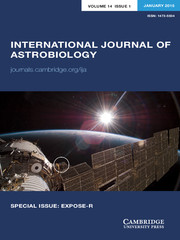Article contents
Aliens are us. An innovative course in astrobiology
Published online by Cambridge University Press: 03 February 2009
Abstract
We live in a scientific world; paradoxically, the scientific literacy of the population is minimal at best. Science is an ongoing process, a human endeavour; paradoxically, students tend to believe that science is a finished enterprise. Many non-science major students are not motivated in science classes; paradoxically, there is a public fascination with the possibility of life in the Universe, which is nowadays a scientific endeavour. An astrobiology course was developed at the Center for Science and Mathematics Education at The University of Texas at Austin to address these paradoxes and includes the following objectives: (a) to improve scientific literacy; (b) to demonstrate that science is a work in progress; (c) to enhance the inherent interdisciplinary aspect of science; (d) to demonstrate that science is embedded in society and relates with several social sciences; (e) to improve the content knowledge about the nature of science; (f) to illustrate how engaging learning science can be; and (g) to draw from the intrinsic motivation already incorporated in the general population. The course has been offered, taught and revised for the past three years. The informal course student feedback has been very positive and encouraging. The purpose of this paper is to provide a general overview of the course. In addition, the course's background, content, themes and mode of delivery are outlined, discussed and analysed in this paper. This paper subscribes to an educational philosophy that focuses on the multidisciplinary nature of science and includes critical thinking-based teaching strategies using the dynamic discipline of astrobiology.
- Type
- Research Article
- Information
- International Journal of Astrobiology , Volume 8 , Special Issue 1: Papers from the Astrobiology Society of Britain Conference 2008 , January 2009 , pp. 51 - 61
- Copyright
- Copyright © Cambridge University Press 2009
References
- 5
- Cited by


